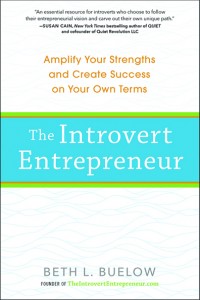
It’s quieter there. No noise, no crowds, no networking or small talk. You’re a private person in a world seemingly filled with extroverts – which makes things difficult when you’re trying to start a business. So how can you work around your need for solitude while you also need to work?
Read “The Introvert Entrepreneur” by Beth L. Buelow. It’s a good start.
People know you as somewhat of a loner. You don’t mind going solo; in fact, you rather prefer it but you can’t: you have a business to run, which creates its own challenges. Crowds are “draining,” but networking is essential. Self-promotion seems like bragging. You like to think things through carefully, but your business needs quick answers.
Yep, like Bill Gates, Michael Jordan, and Warren Buffet, you’re an introvert. The good news is that, also like them, your strengths as an introvert can actually enhance your entrepreneurship, while the obstacles you perceive could, with a little proper effort, become assets.

Open up when communicating by knowing your strengths (introverts are wonderful listeners) and recognizing your challenges (we’re not always good at self-promotion). Embrace fear and remember that it “serves a purpose”; trying to be fearless teaches us nothing and besides, it’s “Hogwash!”
Know your FUDs (“fear, uncertainty, and doubt”) because they represent “something that wants attention.” Learn to determine what’s a true fear, and what’s just a discomfort; one is “unalterable,” while the other can be worked through. Understand that selling is not incompatible with introversion. Embrace social media; it may be an introvert’s best tool. And finally, learn to network.
“If you have to [do it] anyway, you might as well find a way to make it less painful and more profitable.”
As an introvert entrepreneur (note to my editors: Yes. Me!), I was eager to read this book. How can I change my stick-close-to-home tendencies in order to grow my business? The answer was in “The Introvert Entrepreneur,” but it took some digging.
There’s a lot of common knowledge in author Beth L. Buelow’s words, and it’s mixed in with advice from other entrepreneurs, as well as from Buelow herself. If you’ve been around the business block a time or two, that found-in-every-entrepreneurial-book-ever-printed information won’t help you much.
The good stuff comes when Buelow goes past the superficial and into the real work of doing business as an introvert. There – especially in the chapters on fear and networking – are the reasons why I think this book is worth having.
In the end, I found what I truly needed here and, particularly if you’re an introverted business newbie, I think you will, too.
For you, “The Introvert Entrepreneur” is a home run.
